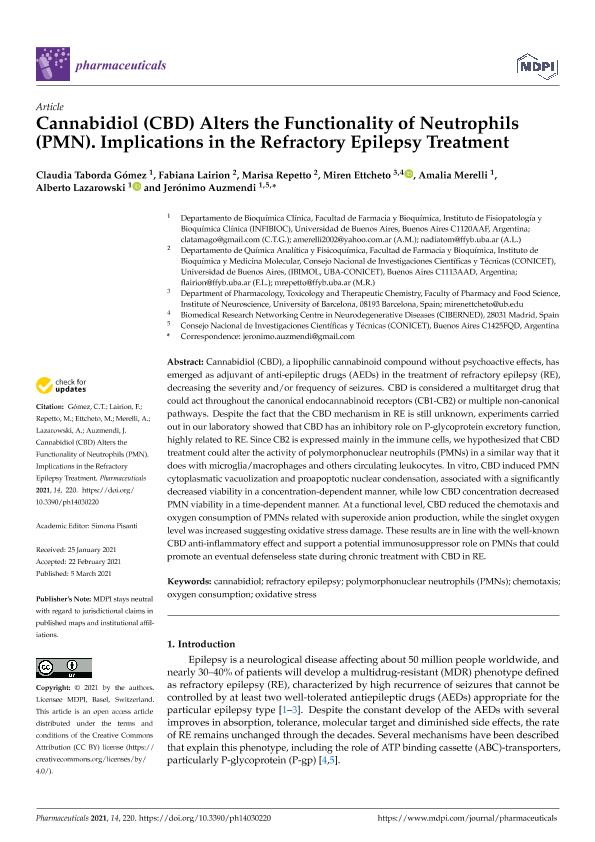Artículo
Cannabidiol (Cbd) alters the functionality of neutrophils (pmn). implications in the refractory epilepsy treatment
Taborda Gómez, Claudia Marcela ; Lairion, Fabiana Norma; Repetto, Marisa Gabriela
; Lairion, Fabiana Norma; Repetto, Marisa Gabriela ; Ettcheto, Miren; Merelli, Amalia Margarita; Lazarowski, Alberto Jorge; Auzmendi, Jerónimo Andrés
; Ettcheto, Miren; Merelli, Amalia Margarita; Lazarowski, Alberto Jorge; Auzmendi, Jerónimo Andrés
 ; Lairion, Fabiana Norma; Repetto, Marisa Gabriela
; Lairion, Fabiana Norma; Repetto, Marisa Gabriela ; Ettcheto, Miren; Merelli, Amalia Margarita; Lazarowski, Alberto Jorge; Auzmendi, Jerónimo Andrés
; Ettcheto, Miren; Merelli, Amalia Margarita; Lazarowski, Alberto Jorge; Auzmendi, Jerónimo Andrés
Fecha de publicación:
03/2021
Editorial:
Molecular Diversity Preservation International
Revista:
Pharmaceuticals
ISSN:
1424-8247
Idioma:
Inglés
Tipo de recurso:
Artículo publicado
Clasificación temática:
Resumen
Cannabidiol (CBD), a lipophilic cannabinoid compound without psychoactive effects, has emerged as adjuvant of anti‐epileptic drugs (AEDs) in the treatment of refractory epilepsy (RE), decreasing the severity and/or frequency of seizures. CBD is considered a multitarget drug that could act throughout the canonical endocannabinoid receptors (CB1‐CB2) or multiple non‐canonical pathways. Despite the fact that the CBD mechanism in RE is still unknown, experiments carried out in our laboratory showed that CBD has an inhibitory role on P‐glycoprotein excretory function, highly related to RE. Since CB2 is expressed mainly in the immune cells, we hypothesized that CBD treatment could alter the activity of polymorphonuclear neutrophils (PMNs) in a similar way that it does with microglia/macrophages and others circulating leukocytes. In vitro, CBD induced PMN cytoplasmatic vacuolization and proapoptotic nuclear condensation, associated with a significantly decreased viability in a concentration‐dependent manner, while low CBD concentration decreased PMN viability in a time‐dependent manner. At a functional level, CBD reduced the chemotaxis and oxygen consumption of PMNs related with superoxide anion production, while the singlet oxygen level was increased suggesting oxidative stress damage. These results are in line with the well-known CBD anti‐inflammatory effect and support a potential immunosuppressor role on PMNs that could promote an eventual defenseless state during chronic treatment with CBD in RE.
Archivos asociados
Licencia
Identificadores
Colecciones
Articulos(IBIMOL)
Articulos de INSTITUTO DE BIOQUIMICA Y MEDICINA MOLECULAR
Articulos de INSTITUTO DE BIOQUIMICA Y MEDICINA MOLECULAR
Articulos(OCA HOUSSAY)
Articulos de OFICINA DE COORDINACION ADMINISTRATIVA HOUSSAY
Articulos de OFICINA DE COORDINACION ADMINISTRATIVA HOUSSAY
Citación
Taborda Gómez, Claudia Marcela; Lairion, Fabiana Norma; Repetto, Marisa Gabriela; Ettcheto, Miren; Merelli, Amalia Margarita; et al.; Cannabidiol (Cbd) alters the functionality of neutrophils (pmn). implications in the refractory epilepsy treatment; Molecular Diversity Preservation International; Pharmaceuticals; 14; 3; 3-2021; 1-12
Compartir
Altmétricas



